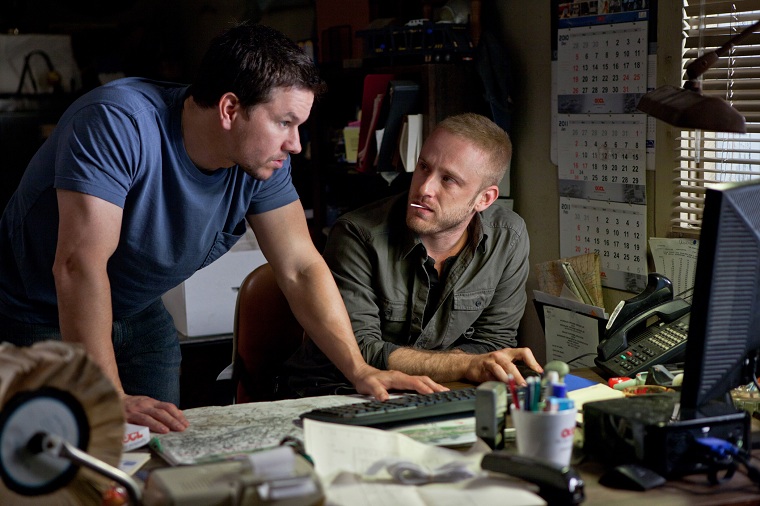Panama Banal, by David Bax
Icelandic director Baltasar Kormákur made his debut in 2000 with a somewhat trite but admirable and enjoyable dark comedy called 101 Reykjavik. He followed that up with the more technically assured but overwrought family drama The Sea two years later. After that, I lost touch with his work so I was surprised to see his name attached to what otherwise seemed to be the usual mid-rate studio action thriller you see dumped into theaters in mid-January. Sadly, that just about sums up Contraband. Despite their flaws, Kormákur’s first two films are undoubtedly character pieces. This latest effort has no interest in that or anything else other than hitting the beats of its less than imaginative story.
In the opening sequence, we see customs officers surrounding and then boarding a cargo ship. One of the ship’s personnel, Andy (Caleb Landry Jones), grabs a duffel bag hidden in his room and, in a panic, throws it into the ocean. We later find out that the bag contained about $700,000 worth of narcotics Andy was smuggling from Panama and that its intended recipient, Briggs (Giovanni Ribisi) is going to kill Andy for losing it. That doesn’t sit well with Andy’s brother-in-law, Chris (Mark Wahlberg), himself a former smuggler who has quit the racket, opened his own business and settled down with a wife, Kate (Kate Beckinsale) and two children. To pay off Briggs and protect Andy, Chris decides to pull one last job, smuggling a few million dollars worth of counterfeit money back from Panama (whose tourism board likely didn’t sign off on this film). Of course, things go astoundingly wrong.
When not filming on location in Panama City (which is to the film’s credit), the story takes place in New Orleans, Louisiana. Because of post-Katrina tax breaks, a lot of films shoot in the Bayou State now and in New Orleans in particular. When dealing with an iconic city, there’s a line that must be walked. It would be too easy to overdo it, filming solely inside the French Quarter and presenting the city as some sort of jazzy, piss-soaked Disneyland, as so many films have done before. On the other hand, it would be criminal to universalize New Orleans and ignore the inherently filmic opportunities in its neighborhoods. Thankfully, with the help of cinematographer Barry Ackroyd, whose magnificent work you know from the films of Ken Loach and Paul Greengrass, Kormákur does the Crescent City proud, showcasing its charming, narrow streets and old America architecture, as well as highlighting the Mississippi River as a roaring centerpiece of the metropolis.
Of course, Kormákur didn’t choose New Orleans to dote on it. It was likely chosen for him for financial purposes. That frugality is often apparent on the screen. At times, it seems the filmmaking was rushed. Perhaps they could have tried again for a better take here or allowed more time for effects there. That feeling of being undercooked extends to the characters as well. We know these people only in the broadest sense. We know what their intentions are but know nothing of their motivations beyond the immediate. Chris assembles a team of fellow smugglers that could be an entertaining bunch of characters but whose dialogue and actions are largely interchangeable. Even good actors are unable to give believable performances. Jones, so great two years ago in The Last Exorcism, is simply annoying and Ribisi’s choices are outlandish and inexplicable. J.K. Simmons holds his own as usual in his role as the ship’s captain but that’s a minor part. Only Ben Foster, as Chris’s closest friend, gives any hint of what this film could’ve been with a deeper, more nuanced approach.
With an uninteresting story and a group of unknowable characters, the film fails to engage, especially in its first half, which is heavy on the set-up. When Chris and his crew do arrive in Panama, though, they meet up with Diego Luna’s Gonzalo, a ridiculously unhinged gangster. The baroque bloodbath of an action set-piece that serves as the film’s turning point is astonishingly dumb and juvenile but it does deserve the credit for focusing the story. The second half is a more enjoyable ride, to be sure, but it’s still too ludicrous to have but the most fleeting impact.
Everything about Contraband is fleeting. It’s an exercise in formula that only manages to excite you a little bit more than it will surprise you, which is not at all. On second thought, that’s not true. One thing I did not expect this film to do was be an insult to the legacy of Jackson Pollock. For as little as it achieves otherwise, it does do that.





























